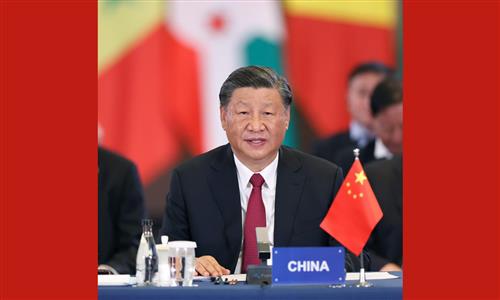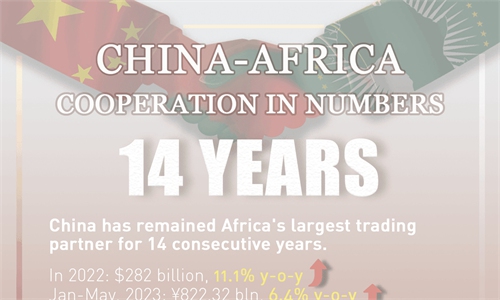
Illustration: Tang Tengfei/Global Times
The 2023 China-Africa Deans of Education Forum was held in Beijing on November 15. The deans of education from China and Africa presented their perspectives and insights on the theme "Transforming Education for Resilient Futures," in particular, "Innovating Education for Creative Societies," "Cultivating Education for Cohesive and Inclusive Societies" and "Preparing Future Teachers for Transformative Work."Their perspectives and insights converge in some aspects while diverging in others.
In reality, the deans play dual roles in their position, serving as both academics and administrators. While they all face varied challenges, it is more about quality in China, while in Africa access is still to be universalized at primary and secondary levels. Both China and Africa are confronted with such issues as teacher shortage; yet in China, the challenge lies more in rural and underdeveloped areas which have already largely been addressed by the government-led initiative, while in Africa, it still prevails in most areas. There are also typical issues such as child marriage and early childbearing in Africa which no longer exist in China.
All the presentations are academic; yet Chinese deans are more like thought-leaders in the field of education, and African deans are more like investigators. Hence the Chinese deans' presentations are mostly advocative. However, the African deans' presentations are interpretive and even empirical. These also relate to the norms of research methodology in China and Africa that are influenced by academic traditions inherited from history. China's academic culture obviously originates from ancient times. Education in Africa and its methodology have been heavily impacted by evidence-based research from the West.
As a result of opening-up, Chinese deans mostly take an international perspective, integrating the trends from China and other parts of the world, looking into the issues of China in the broader context of global development, which is also aligned with the rising role of China in global governance. Whereas most African deans take a national perspective and situate their viewpoints and analyses in a national context, which can be explained by the urgency of challenges that they are facing and their commitment to resolve the issues. The differences of these perspectives also reflect the different developmental stages of China and African countries.
African deans mostly presented from an institutional perspective, relating their presentation to the performance of their education sector and even their own institution, while Chinese deans mostly presented from a social perspective, relating the role of education to economic growth, social cohesion and technological innovation. It is accountable that Chinese deans aim at a higher quality of education and a larger role of education in building a strong nation, while African deans strive to resolve the challenges and achieve the goal of access and equity.
Nevertheless, deans from both China and Africa contextualize these education issues and challenges in the sustainable development goals, aspiring for inclusive and quality education for all. Both of them see technology as a catalyst for educational development for digital empowerment. Also, both education systems are in the process of shifting from examination-oriented education to competency-based education.
The event echoes the Sustainable Development Goal 4 proposed by the UN, particularly, "By 2030, substantially increase the supply of qualified teachers, including through international cooperation for teacher training in developing countries, especially least developed countries and small island developing States." Worldwide teacher shortage has been a prevailing and persistent issue. China has successfully addressed this through an array of strategic policies and initiatives since the turn of the century, ranging from exempting tuition for students majoring in teacher education, to allocating centrally earmarked funds to pay for the salary of university students who chose to work as rural teachers and to introducing a nationwide teacher training program implemented by selected universities and colleges.
In line with these national initiatives, Beijing Normal University, a flagship university in teacher education in China, has developed a series of projects to fill the gap of rural teachers and improve the quality of education in rural areas, especially through the Qiangshi Plan for Quality Teachers that provides both pre-service and in-service teacher education and training to improve teacher quality in less-developed and rural regions.
In the same vein, resonating the call for international cooperation to increase the supply of qualified teachers in developing countries in UNESCO Education 2030, the Faculty of Education at Beijing Normal University, in collaboration with UNESCO International Institute for Capacity Building in Africa and International Research and Training Centre for Rural Education under the auspices of UNESCO, proposed to establish a network of China Africa Institutes of Education, which is also aligned with Continental Education Strategy for Africa 2016-25 that emphasizes the importance of revitalizing the teaching profession and increasing the supply of quality teachers. The network, a highlight of the forum, aims to enhance the capacity of institutes of education, fostering a high-quality teaching force in China, Africa and beyond, building on diverse and robust policies and practices on teacher education and teachers' professional development.
The deans of education, from both China and Africa, are committed to long-term collaboration on the platform of the network. They believe that this not only enhances South-South learning and capacity building, but by joining hands, over the long run, their efforts will make positive changes by bringing more and better education opportunities to children and youths in China and Africa.
Wang Yan is an associate research fellow at the Academy of Regional and Global Governance, Beijing Foreign Studies University. Zhao Yuchi is the executive director of UNESCO International Research and Training Centre for Rural Education. opinion@globaltimes.com.cn


